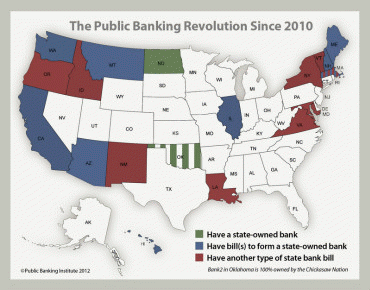Seventeen states have
now introduced bills for state-owned banks, and others are in the works. Hawaii's innovative state bank bill addresses
the foreclosure mess. County-owned banks
are being proposed that would tackle the housing crisis by exercising the right
of eminent domain on abandoned and foreclosed properties. Arizona has a bill that would do this for
homeowners who are current in their payments but underwater, allowing them to
refinance at fair market value.
The long-awaited settlement between 49 state Attorneys General and the big five robo-signing banks is proving to be a major disappointment before it has even been signed, sealed and court approved. Critics maintain that the bankers responsible for the housing crisis and the jobs crisis will again be buying their way out of jail, and the curtain will again drop on the scene of the crime.
We may not be able to beat the banks, but we don't have to play their game. We can take our marbles and go home. The Move Your Money campaign has already prompted more than 600,000 consumers to move their funds out of Wall Street banks into local banks, and there are much larger pools that could be pulled out in the form of state revenues. States generally deposit their revenues and invest their capital with large Wall Street banks, which use those hefty sums to speculate, invest abroad, and buy up the local banks that service our communities and local economies. The states receive a modest interest, and Wall Street lends the money back at much higher interest.
Rhode Island is a case in point. In an article titled "Where Are R.I. Revenues Being Invested? Not Locally," Kyle Hence wrote in ecoRI News on January 26th:
According to a December Treasury report, only 10 percent of Rhode Island's short-term investments reside in truly local in-state banks, namely Washington Trust and BankRI. Meanwhile, 40 percent of these investments were placed with foreign-owned banks, including a British-government owned bank under investigation by the European Union.Further, millions have been invested by Rhode Island in a fund created by a global buyout firm . . . . From 2008 to mid-2010, the fund lost 10 percent of its value -- more than $2 million. . . . Three of four of Rhode Island's representatives in Washington, D.C., count [this fund] amongst their top 25 political campaign donors . . . .
Hence asks:
Are Rhode Islanders and the state economy being served well here? Is it not time for the state to more fully invest directly in Rhode Island, either through local banks more deeply rooted in the community or through the creation of a new state-owned bank?
Hence
observes that state-owned banks are "[o]ne emerging solution being widely
considered nationwide . . . . Since the
onset of the economic collapse about five years ago, 16 states have studied or
explored creating state-owned banks, according to a recent Associated Press
report."
2012 Additions to the Public Bank Movement
Make that 17 states, including three joining the list of states introducing state bank bills in 2012: Idaho (a bill for a feasibility study), New Hampshire (a bill for a bank), and Vermont (introducing THREE bills--one for a s tate bank study, one for a state currency, and one for a state voucher/warrant system). With North Dakota, which has had its own bank for nearly a century, that makes 18 states that have introduced bills in one form or another--36% of U.S. states. For states and text of bills, see here.
Other recent state bank developments were in Virginia, Hawaii, Washington State, and California, all of which have upgraded from bills to study the feasibility of a state-owned bank to bills to actually establish a bank. The most recent, California's new bill, was introduced on Friday, February 24th.
All of these bills point to the Bank of North Dakota as
their model. Kyle Hence notes that North
Dakota has maintained a thriving economy throughout the current recession:
One of the reasons, some say, is the Bank of North Dakota , which was formed in 1919 and is the only state-owned or public bank in the United States. All state revenues flow into the Bank of North Dakota and back out into the state in the form of loans.Since 2008, while servicing student, agricultural and energy-- including wind -- sector loans within North Dakota, every dollar of profit by the bank, which has added up to tens of millions, flows back into state coffers and directly supports the needs of the state in ways private banks do not.
Publicly-owned Banks and the Housing Crisis
A novel approach is taken in the new Hawaii bill: it proposes a program to deal with the housing crisis and the widespread problem of breaks in the chain of title due to robo-signing, faulty assignments, and MERS. (For more on this problem, see here.) According to a February 10th report on the bill from the Hawaii House Committees on Economic Revitalization and Business & Housing:
(Note: You can view every article as one long page if you sign up as an Advocate Member, or higher).






